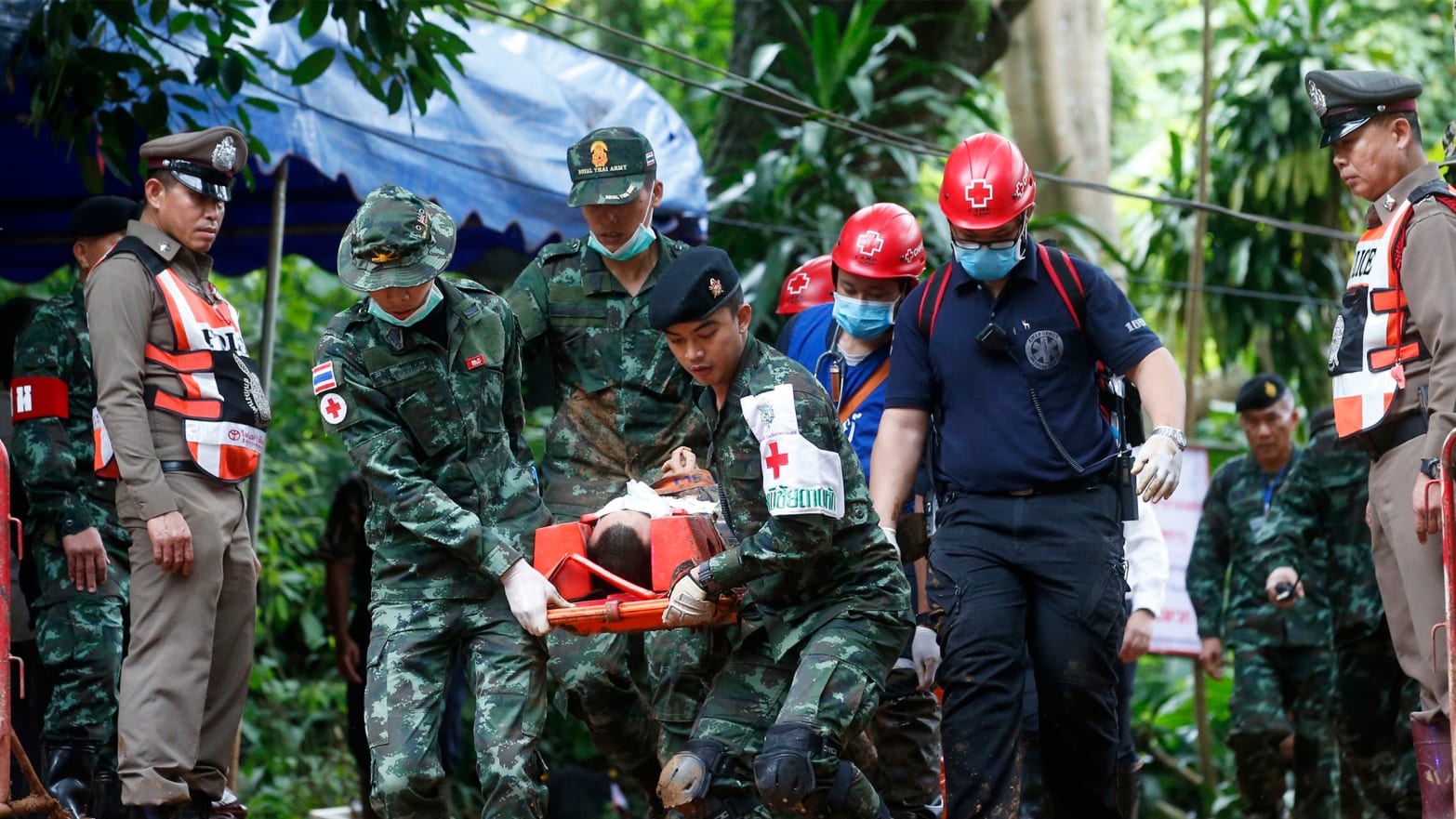BANGKOK—Curious onlookers still linger near the Chiang Mai hospital where a dozen boys and their soccer coach are being treated after their dramatic three-day rescue from a flooded cave. Inside, the youths are receiving antibiotics, vitamins, and solid food and walk about unaided as they pursue what appears to be a smooth return to normal life.
“Overall, the 13 people are in very good condition,” Dr. Thongchai Lertwilairatanapong, inspector general of the Ministry of Public Health, told reporters Wednesday.
The Wild Boars soccer team, ages 11 to 17, and their 25-year-old coach are in good spirits, with some members visiting with relatives who must wear protective garments and keep a distance of at least six and a half feet to reduce any risk of infection. Authorities released the first video of the evacuees in their lily-white hospital ward, masked, smiling, and sitting up in their beds, some flashing V-for-victory signs, others clutching electronic devices.
But mental-health experts caution that the boys might suffer varying degrees of emotional distress after their two-week ordeal in the immense Tham Luang cave that was so dark one veteran diver said the youths experienced the equivalent of “going instantly blind.”
“There’s a lot of adrenaline, so they seem fine at first, but once it settles in they may have a delayed reaction,” says Singapore psychiatrist Dr. Lim Boon Leng. “With something like this, which is pretty traumatic, what we really worry about in the first month, they may be jittery and nervous. If it goes beyond one month then they could have post-traumatic stress disorder…when they start to feel the world is a bad place.”
Looking past the current rescue euphoria, Lim tells The Daily Beast that the boys—who are scheduled to remain in the hospital for at least another week—will need psychological evaluations after the first month and should receive mental-health checkups at regular intervals.
Dr. Samai Sirithongthaworn, a psychiatrist and deputy director general of the ministry’s mental-health department, said the cave survivors will be under close scrutiny in their first two weeks at the hospital, then will likely require mental-health checkups in three months to “make sure they can be flexible or not” with a follow-up within six months.
While PTSD can be an issue, it may not occur at all, depending on how each boy responds, Samai tells The Daily Beast.
Lim says the youths should be left to re-establish normal relations with their families and friends. “In the first month too much professional intervention is not really useful,” he says.
Dr. Jom Choomchuay endorses that prescription. The youths should be allowed as normal a life as possible, says Jom, a specialist in child and adolescent psychiatry at Merak Clinic in the Bangkok suburb Nonthaburi. While some kids might start “acting out” or have delayed reactions, “One factor that can prevent emotional disorder or psychotic break is support from family and school,” he tells The Daily Beast.
Lim and Jom say the boys must be left to recuperate and not have to deal too much with people or press who, in the words of the Singapore doctor, “might tend to romanticize the ordeal.” Whatever happens must be guided by what benefits the children, who should not be used as celebrities just because that benefits society or TV or other media, Jom says. “They’re famous now, but it’s not real, it’s temporary,” he says.
Families should talk about what happened but not interrogate the boys, allowing them to “control the situation” and not answer questions they might not want to address, he adds. Parents should protect but not be “overprotective,” he says. “You don’t want to create emotional stress; let them feel they’ve overcome.”
Health ministry officials say all 13 evacuees will be kept in quarantine at Chiangrai Prachanukroh Hospital and their health monitored for seven days after they are discharged.
Like the Rohingya in Burma, three of the boys, as well as their coach, Ekkapong Chantawong, are stateless ethnic minorities. The four have gone back and forth across the border between Thailand and Burma. One boy, 14-year-old Adul Sam-on, is a member of Burma’s Wa tribe—and speaks four languages, including English. Authorities say his English proficiency was important in the group’s rescue because he was able to communicate with, and translate for, the British divers who located them on July 2, after they went missing on June 23.
Any hardship Adul and his two teammates have previously endured in their passport-free existence could make them more susceptible to emotional fallout from their cave ordeal—or help them better cope, says Lim.
“Given he [Adul] came from a difficult background, he might have experienced previous trauma and could be a risk for stress if he doesn’t have the great social support like the rest of the kids,” says Lim. “But he’s also someone who maybe is more mentally resilient.”
Jom says no one can predict whether the older or younger boys will be more or less traumatized over the longer term. The assumption, he says, is that the older teenagers will be less damaged, but it depends on how they perceive the situation.
“The teenager might cope better in theory, but who knows,” he said. “The younger ones might tend to cling to their parents, but they also might do better, because they might come to think of the experience as an adventure.”
Jom, who praised the teamwork of the rescue operation and leadership of Thai officials, urged authorities to rely on a “normal process” to address stress and anxiety, lauding the cohesion that the boys and their coach displayed in the cave and the fact that they meditated together to help get through the crisis.
“There’s no need to jump straightaway into medication unless there’s a clear need,” he says.
